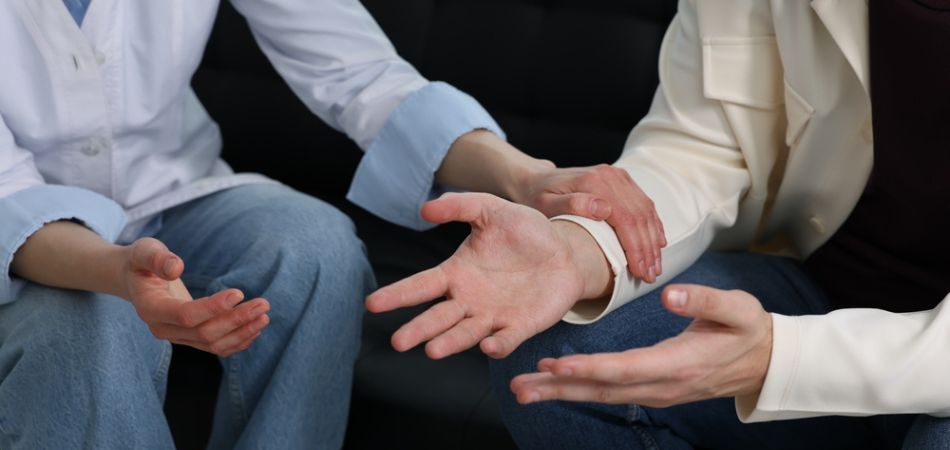Last Updated:
September 29th, 2025
It’s one of the hardest truths to face: knowing you need help, but not knowing how to ask for it, or feeling like you don’t deserve it in the first place.
Addiction has a way of convincing you that this is just your life now. That you’ve messed up too badly. That help is for other people.
You aren’t alone. We pray that every struggling person can see the wellspring of hope in addiction treatment, and we want to remind you that help is not beyond your reach.
If you are ready, so are we.
What is professional help for addiction?
For a person battling with addiction, professional help means relinquishing some control and stepping into a structured environment, where recovery begins. Turning to a professional to help you work your way out of an alcohol or substance use disorder (AUD or SUD) means you no longer have to figure out your recovery plan alone.
At its heart, professional treatment addresses both the physical and psychological drivers of addiction. Many people who try to quit on their own cannot succeed because only the physical side of quitting is taken into account. This is the detoxification phase, which is fraught with its own dangers, like withdrawal symptoms.
Yet half the battle still remains, which is the emotional minefield of maintaining that sobriety you worked so hard to reach. Therapy can be one of the most profound tools for overcoming addiction, so expert therapists help you come to terms with, and eventually reframe, the silent but relentless drivers of cravings and urges to relapse.
While a person may have the deep inner strength to overcome addiction alone, more often than not, professional help becomes the key that opens the door for a brighter, sober future.
How “not wanting help” becomes part of the addiction
Addictions have the tragic propensity to distort a person’s entire world outlook. In cognitive behavioural therapy (CBT), one part involves understanding “cognitive distortions,” which are inaccurate or irrational patterns of thinking that negatively impact your emotional well-being and behaviours.
You may find many of the listed “cognitive distortions” illuminating, yet one of the most pertinent for many in addiction is a distortion called “catastrophising.” This means a person assumes the worst when faced with the unknown (in this case, the “unknown” is entering rehab treatment). When a person continually catastrophises, no hope can be imagined in receiving professional support, and a person dooms themselves to a future of addicted submission, while life slowly gets worse.
Coping becomes surviving, and eventually, surviving becomes exhausting. In this way, the cyclical suffering becomes a person’s new normal, and getting the help you deserve feels further and further from your reach.
Building towards hope while acknowledging pain
The deepest forms of support won’t ask you to be ready for everything at once. They will only ask you to be open to the first step, which includes an acknowledgement of your pain.
Many people are held back from seeking professional help because they feel like they have to put on a brave face or bury the life they’ve been through. Yet, when you take the time to meet treatment providers in the middle, you will understand that the past can be better processed before you turn your back on it and head into a hopeful future.
The support found in professional addiction treatment will honour your experiences and reconnect you to the hope you felt as a child, even if it feels faint at first. You won’t be rushed, and you’ll be around people who understand that progress happens in small shifts, not dramatic expectations.
You don’t have to be healed to begin. You just have to want something better than the pain that’s holding you in its tormenting embrace.
What changes when you stop trying to quit by yourself?
There’s a world of difference between going it alone and getting professional help for addiction, and this world is yours to inherit.
Most people with an addiction have tried to quit by themselves, but addiction is a condition that rewires the brain, and is almost always buried so deeply that willpower alone will not extinguish its dark flames. When you have access to professional treatment, you’re no longer carrying the burden all by yourself.
Quitting with professionals means you’ve got access to a full spectrum of care:
- Detoxification explained: There can be severe withdrawal symptoms as you go through medical detoxification for alcohol or drugs. Trained professionals are on hand to help you manage and to closely keep an eye on any complications.
- Therapy options for addiction: Your treatment providers will have extensive knowledge of evidence-based therapies, stretching from one-to-one therapy, group support, trauma therapy, CBT, DBT and more.
- Supportive environments: One of the most profound differences will come when you’re in the company of others who have been, or currently still are, in the same situation as you. There will never be shame or judgement placed, only the grounds for healing.
How intervention becomes a tinderblock for healing
Not every journey to recovery begins with personal readiness. Sometimes, it starts with someone else refusing to give up on you. The essence of intervention is a moment when silence is broken, when love steps forward, when the denial of addiction is finally challenged.
When your friends or family calmly voice their concerns, you may finally see the cracks in the life you’ve worked hard to hold together. Then, when intervention is followed by a clear treatment pathway and a structured rehab plan, that opening can become the first light on the sometimes lonely road to recovery.
The crucial element of aftercare and relapse prevention
A person might be held back if they believe recovery ends once treatment finishes. In truth, this is where some of the greatest journeys begin. Aftercare is in place to keep you equipped with the tools and insights you need to remain sober, for as long as you desire. You are the person in control.
Aftercare offers regular check-ins with support groups and access to relapse prevention strategies tailored to your needs. It’s a safeguard and a way to keep moving forward even when life throws you a curveball.
The reframing of recovery – from “punishment” to “rebuilding”
When we think of professional addiction treatment, we often paint a picture of a stern and solemn procedure, wherein a person must be “forgiven” for the choices they’ve made. However, your treatment providers understand the complex drivers of addiction, how it eats away at your control, and inevitably takes the driving seat. There is no need to consider getting help as punishment. It is actually an act of self-care, in which you build the house of tomorrow with the bricks of today.
Professional help for addiction will help you shift into a mindset that you truly are worth it. It is crucial to remember that addictions will distort your sense of self-worth, so if you’ve lost the feeling of self-appreciation, understand that it waits for you in professional treatment.
I don’t want this pain anymore. Where can I get help?
If you’ve reached the point where carrying on like this just isn’t an option anymore, know this: you don’t have to figure it all out alone.
At Linwood House, we guide you through every step of the recovery journey, from medically assisted detoxification to personalised therapy options for addiction. We don’t just help you stop. We integrate ourselves with your lifelong journey of sobriety.
Aftercare and relapse prevention support ensure that healing doesn’t end when you leave. If you’re unsure how rehab works or whether this is the right time, our admissions team are waiting to talk you through it, without pressure.
You don’t need to be “ready.” You just need to reach out. Let this be the moment everything begins to change, for a brighter, sober future.
(Click here to see works cited)
- Stanborough, Rebecca Joy. “Cognitive Distortions: 10 Examples of Distorted Thinking.” Healthline, Healthline Media, 25 Oct. 2022, www.healthline.com/health/cognitive-distortions.
- “Drugs and the Brain.” National Institutes of Health, U.S. Department of Health and Human Services, 8 Jan. 2025, nida.nih.gov/publications/drugs-brains-behavior-science-addiction/drugs-brain.



